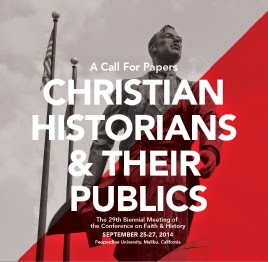 I plan some posts today from the Conference, although not in order of presentation.
I plan some posts today from the Conference, although not in order of presentation.
I intend to blog this session so John Fea can’t post on it first. He is on the panel. I am pretty sure I will get this out first.
John Fea, Chris Gerhz, and Paul Putz are sitting on a panel where they are displaying their blogs and discussing their efforts on social media. John Fea was live tweeting it as it took place.
Jon Den Hartog is setting up the panel now and asking good questions. One, do Christian historians bring certain virtues to the discussion of history? Another question, what is the direction from here with historians and social media.
John’s model for blogging is the Andrew Sullivan’s Daily Dish. He started it to help promote his work, and it has become his online vita. Sunday night Odds and Ends has become a regular feature of the blog. Another is: So What Can You Do With a History Major?
John’s virtual office hours is a hit on the blog. His blog has become a legitimate piece of his scholarly work with full support of Messiah college.
Is blogging scholarship? Not in the traditional manner, according to Fea. However, he says it is a form of public engagement and service.
Chris Gerhz is up now and is talking about his 3 years of blogging and his 5 (!) blogs. He also started blogging to extend his scholarly work and perhaps has written enough in 3 years to fill a book.
He has used a blog to assist with a class; and another to promote his department. He also promotes what history majors can do with their major. I think I need to start doing that with psychology majors. What can you do with a BA/BS in psychology? Might be short and repetitive but I might be surprised. Chris also runs a research oriented blog.
Writing History in the Digital Age is a book featured by Chris in his talk.
Chris learned to write via blogging, and thinks out loud about projects and topics of interest; blogging as “pre-argument.”
Now Paul Putz. Paul was a teacher and has become a historian. Paul was converted to become a historian via the Religion in American History blog. The power of blogging.
Social media takes up a lot of time and won’t make you an historian, Paul says, but it is a public expression of what he is doing as a grad student. Blogging gets his work out there where it could actually be read by other historians. My words, blogging is a high wire act; high risk, possibly high reward. Write something good and someone might notice.
As a graduate student, blogging allows Paul to join the online community of scholars and find community. I certainly agree with this point.
Paul’s paper is so good that I kind of missed the end of it. One of the cool exhortations was to promote other people with your blogging which is a good way to avoid fluffy self-preoccupation.
Now Jon Den Hartog is opening it up for questions.
Question: Should you put up content on the blog which will later be in a book? Will people buy it if they can get it on the blog. The panel members don’t do that with the exception of a book Fea did where he build chapters around some blog posts. I know from experience that the book is always going to be worth buying.
Lots of conversation about the meaning of online community ended the session.
Grove City College’s Gary Scott Smith chimes in with a question about writing op-eds and columns for major newspapers. Way to represent GCC GSS! Most of the responses indicate that social media blends seamlessly into print media opportunities. I have certainly found this to be true.